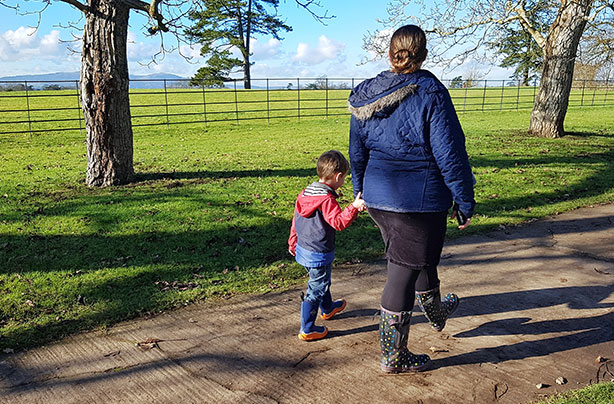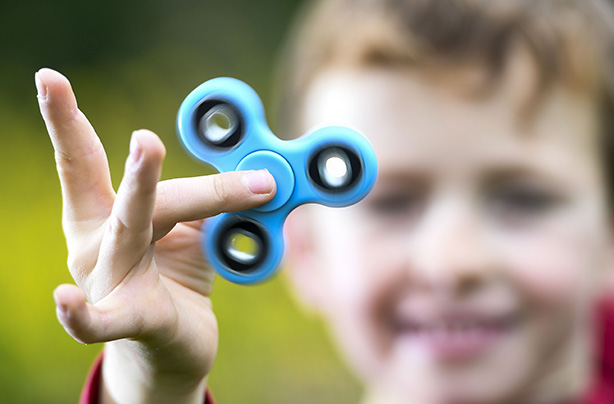Banning fidget spinners DISCRIMINATES against my autistic son (and those like him)
'To deny him extra sensory stimulation is like denying him oxygen'

Fidget spinners are the latest craze amongst children, but many teachers and parents are divided over whether they're a bit of harmless fun, or a major classroom distraction.
Some schools have even gone as far as to ban the gadgets altogether - but this can mean that children with conditions like autism and ADHD are unable to access the toys as sensory aids, which can help them in many aspects of their day to day routine.
Here, teacher Danielle Duggins, who is mum to a son with autism, and blogs about her experiences at Someone's Mum, explains why she believes banning fidget spinners risks alienating the children that we have pledged to include....

If you had asked me five years ago if items like fidget spinners should be banned in schools, I would have said yes – unequivocally yes.
I would have been one of those cynical teachers, one who rolled their eyes inwardly when a pupil said they 'needed' a fidget toy.
I know the scenes that are going on in classrooms around the country now. I know that they are endemic. I know that it is all about who has the best one, who can make them spin the most. I know that they are a huge distraction for the whole class, that teachers everywhere are weary of the constant battles - 'But Sir! It helps me concentrate!' and 'Why is he allowed one and I'm not?'
But I also know that I was naive, before I had a child on the autism spectrum. And I know that most of us still have a lack of understanding about what that means.
GoodtoKnow Newsletter
Parenting advice, hot topics, best buys and family finance tips delivered straight to your inbox.
My son cannot be still. He cannot tolerate silence. It is not habit. It is not bad parenting. It is an inherent part of his nature. Sensory seeking is more than just a coping mechanism for him – it informs and influences everything he does. To deny him extra sensory stimulation is not just an inconvenience, or a punishment – it would be like denying him oxygen. He is unable to function without it.
It is very difficult for someone who does not see this, live with this - every day - to understand.
If fidget spinners had turned up in my classroom five years ago, I would have insisted that they go. Today, I know that to ban them wholesale is discriminatory, plain and simple. Banning them risks alienating children who are already vulnerable, who already struggle to cope in an environment that is not designed to meet their needs. It excludes those whom we have pledged to include.
Yes, they are a distraction. Yes, they have the potential to disrupt learning and make teachers despair. I get it. I really do. But there are also children everywhere who suddenly feel like their disability is not a disability at all. There are children who struggle with communication and social awareness, interacting with their peers. Sensory play, which is often seen as something children should not engage in, past their early years, is suddenly normal for all, if only for a short time.
And when the craze is over, when the hype dies down and fidget spinners are no longer 'the thing' to have, children with autism and ADHD will still need them. My son will need them. It is essential that schools make sure that those who have extra sensory needs still have access to items like fidget spinners.
Making sure that sensory toys do not become a barrier to learning, ensuring that they do not have a detrimental effect on overall behaviour – it is a difficult task. A blanket ban is the easiest way to stop this - I understand. It is always easiest to simply exclude those who are different, when their differences become a problem.
But I like to hope, with a bit of creative thinking, schools can ensure that they embrace the best parts of the fidget spinner craze and minimise the problems they cause – without banning them entirely - because I have to hope I live in a world where my son will never be made to feel like his needs are an inconvenience.
Trusted, informative, and empathetic – GoodToKnow is the ultimate online destination for parents. At GoodtoKnow, our mission is 'simple': we're trying to make sense of parenthood. On the site, you'll find everything you need for a happy, healthy family life. Our huge archive of content includes more than 18,000 articles and 1,500 how-to videos. These include expert-backed advice features on parenting, dealing with relationship changes after having a baby, self-care for mums and managing your family finances. We also feature tried-and-tested product reviews and buying recommendations for every stage of family life - from prams and Moses baskets to birthday gifts and top toys.